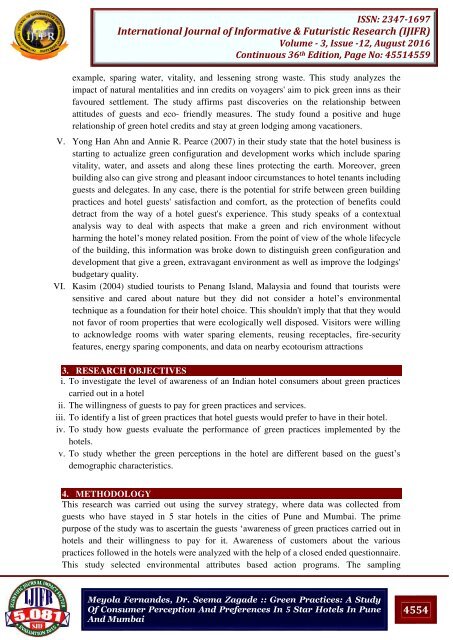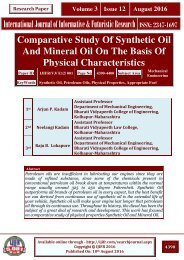IJIFR VOLUME 3 ISSUE 12 AUGUST 2016
RESEARCH PAPER
RESEARCH PAPER
Create successful ePaper yourself
Turn your PDF publications into a flip-book with our unique Google optimized e-Paper software.
ISSN: 2347-1697<br />
International Journal of Informative & Futuristic Research (<strong>IJIFR</strong>)<br />
Volume - 3, Issue -<strong>12</strong>, August <strong>2016</strong><br />
Continuous 36 th Edition, Page No: 45514559<br />
example, sparing water, vitality, and lessening strong waste. This study analyzes the<br />
impact of natural mentalities and inn credits on voyagers' aim to pick green inns as their<br />
favoured settlement. The study affirms past discoveries on the relationship between<br />
attitudes of guests and eco- friendly measures. The study found a positive and huge<br />
relationship of green hotel credits and stay at green lodging among vacationers.<br />
V. Yong Han Ahn and Annie R. Pearce (2007) in their study state that the hotel business is<br />
starting to actualize green configuration and development works which include sparing<br />
vitality, water, and assets and along these lines protecting the earth. Moreover, green<br />
building also can give strong and pleasant indoor circumstances to hotel tenants including<br />
guests and delegates. In any case, there is the potential for strife between green building<br />
practices and hotel guests' satisfaction and comfort, as the protection of benefits could<br />
detract from the way of a hotel guest's experience. This study speaks of a contextual<br />
analysis way to deal with aspects that make a green and rich environment without<br />
harming the hotel’s money related position. From the point of view of the whole lifecycle<br />
of the building, this information was broke down to distinguish green configuration and<br />
development that give a green, extravagant environment as well as improve the lodgings'<br />
budgetary quality.<br />
VI. Kasim (2004) studied tourists to Penang Island, Malaysia and found that tourists were<br />
sensitive and cared about nature but they did not consider a hotel’s environmental<br />
technique as a foundation for their hotel choice. This shouldn't imply that that they would<br />
not favor of room properties that were ecologically well disposed. Visitors were willing<br />
to acknowledge rooms with water sparing elements, reusing receptacles, fire-security<br />
features, energy sparing components, and data on nearby ecotourism attractions<br />
3. RESEARCH OBJECTIVES<br />
i. To investigate the level of awareness of an Indian hotel consumers about green practices<br />
carried out in a hotel<br />
ii. The willingness of guests to pay for green practices and services.<br />
iii. To identify a list of green practices that hotel guests would prefer to have in their hotel.<br />
iv. To study how guests evaluate the performance of green practices implemented by the<br />
hotels.<br />
v. To study whether the green perceptions in the hotel are different based on the guest’s<br />
demographic characteristics.<br />
4. METHODOLOGY<br />
This research was carried out using the survey strategy, where data was collected from<br />
guests who have stayed in 5 star hotels in the cities of Pune and Mumbai. The prime<br />
purpose of the study was to ascertain the guests ‘awareness of green practices carried out in<br />
hotels and their willingness to pay for it. Awareness of customers about the various<br />
practices followed in the hotels were analyzed with the help of a closed ended questionnaire.<br />
This study selected environmental attributes based action programs. The sampling<br />
Meyola Fernandes, Dr. Seema Zagade :: Green Practices: A Study<br />
Of Consumer Perception And Preferences In 5 Star Hotels In Pune<br />
And Mumbai<br />
4554



